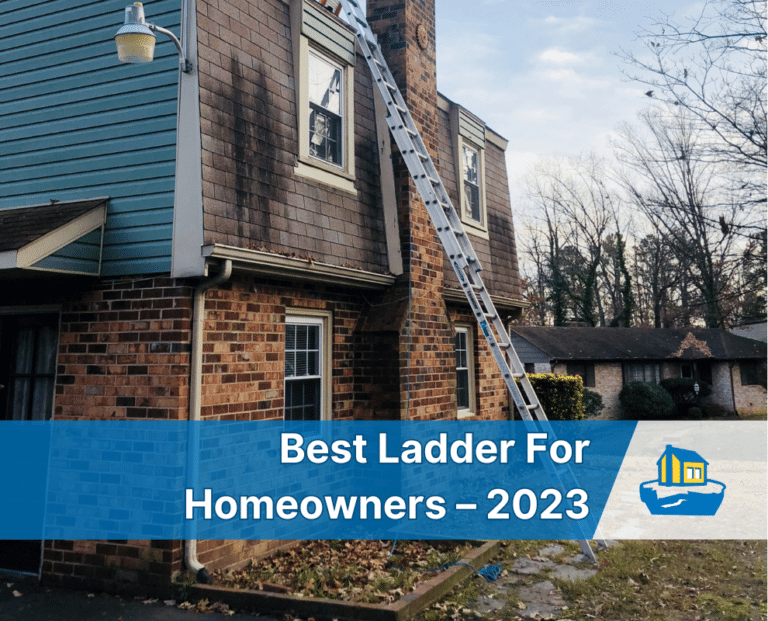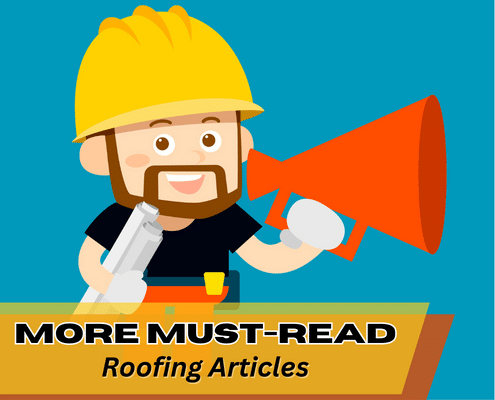4.8 1700+ Google Reviews

I have an obsession with ladders. Although home inspectors are not required to have, carry, or use ladders, I own about 20 ladders between my company and my household. There are many different types of ladders, and I have used them all. Therefore, I am definitely qualified to recommend the best ladder for homeowners.
There really is no “best ladder.” Every ladder has a different purpose, and the “right ladder” depends on the situation. . As a homeowner, you aren’t likely to have more than one ladder. However, if you don’t have one, you should definitely consider investing in a ladder.
You may need them to change light bulbs, paint, clean gutters, do DIY projects and do home maintenance.
Regardless of the ladder type you choose, you will need to keep a few things in mind.
Ladders generally come in two materials – fiberglass ladders and aluminum ladders.
An aluminum ladder is generally lighter and cheaper. However, aluminum is conductive and is not safe for electrical work or around power lines.
Fiberglass ladders are generally heavier and more expensive. However, the apparent benefit is that they are much safer around electricity. Modern technology has made many fiberglass ladders lighter but usually heavier than the same-size aluminum ladder.
Ladders get listed for specific loads/weight capacity. Placing more weight on a ladder than the listed maximum can cause failure and severe injury. Pay attention to the duty rating
There are five categories of ladder Duty Ratings:
Add up your weight, a few pounds for your clothing, the weight of the tools you typically carry on you, and the weight of any tools you will store on the ladder, such as paint cans. Use that sum to figure out which duty rating you should get.
You need to factor in the maximum height of your workspace when choosing a ladder. Remember that you should have approximately three rungs (3 feet above the gutter line) and never step on the top two rungs. That is why the height of the ladder and the maximum reach listed on the ladder are not the same.
If you have a two-story home, a 24 ladder may be sufficient if a slab on grade or a deck. However, with tall ceilings or a tall foundation stem and no deck, you will probably need a 28-foot ladder. If you have a ranch or do not intend to use your ladder for exterior projects, then you could go for a shorter one.
Ladder safety is not something to take lightly. The United States leads the world in ladder injuries and deaths. Every year, over 164,000 reported emergency-level accidents and over 300 deaths. This is generally from misuse of the ladder. Many manufacturers are adding better safety features to battle these statistics. So, the best ladder for homeowners is the safest ladder.
One of the most important safety features is adjustable legs for uneven surfaces. Using pieces of wood, bricks, and anything you can find to level a ladder is very dangerous. Invest in a ladder (and your health) by buying a ladder with adjustable legs.
Other safety features include double pulleys to reduce the strain on your back, rubber feet for preventing slipping, non-slip treads, and level gauges that let you know when your ladder is at the correct angle.
Little Giant is the leader in producing high-quality, safe ladders. The Epic Little Giant is my top pick. It is jam-packed with safety features and functionality. In addition, it is absolutely the most versatile ladder on the market, making it the best ladder for homeowners. This is an excellent choice if you want a sturdy ladder that is great for home use but could also stand up to all construction sites.
Built-in ladder levelers – These are the easiest to use of all the levelers on the market. Make your ladder level, place your foot on the leveler, and push down until it reaches the floor.
Multiple positions – These ladders can be used as A-frame ladders and extension ladders and can easily be used on stairs since each side extends to different lengths. In addition, these various positions allow you to have just one ladder instead of multiple ladders.
Wheels – Carrying around a ladder can be hard on the back and shoulders. These wheels allow you to roll your ladder between locations.
Safety rails- The most dangerous part of using a ladder is getting on and off the roof. The retractable safety fails easily flip up to allow for easily transitioning from the ladder to the roof.
Extra features – Little Giant Ladders come with an array of products that you can attach to the ladder, such as a paint tray, tool tray, safety standoff, and more.
Fiberglass is not economical- Little Giant does make these ladders in fiberglass, but they are very expensive and do not include the levelers.
Heavy and cumbersome- The trade-off for safety and functionality is weight and ease of use. The 26-foot version is a whopping 56 pounds, and they don’t have ropes and pulleys to raise the ladder, making them more challenging to use.
Storage Space- Although it doesn’t take up as much space as a tall A-frame or extension ladder, it is still bulky and can be hard to store if you don’t have a lot of space.
If you don’t have, or want to use a lot of storage space for your ladder, atelescoping ladder is an excellent choice. Xtend and climb is by far thepremium brand for this type of ladder. I have seen many of the cheaper brands fail and injure home inspectors. The 15.5″ model collapses down to a totally manageable 36″ x 20′ which can totally fit in a closet.
Easy storage- The compact size of these ladders make them easily fit in any closet, in the crawlspace, in the shed, or pretty much any other storage space you have.
Heavy Duty Ratings available- Despite their small size when collapsed, xtend and climb makes ladders with up to 300-pound capacity.
Safety Indicators – Telescoping ladders can be a little sketchy. If you don’t use it correctly, or you get a cheap off-brand, they can collapse. Xtend and climb has a built-in visual indicator for the locking mechanism to let you know when you have extended it properly.
Maximum Height- The maximum height model is 15.5 feet when fully extended. That may be tall enough for a ranch, but you’ll need an additional ladder if you need a taller ladder.
Usefulness- This is a straight ladder that needs to be leaned against a wall to be used. You will not be able to safely use it to change a light fixture in the middle of a room or similar tasks.
Price- The convenience of the storage and durability comes at a price. I personally find them to be very affordable, but some people with basic needs may not see the value.
The extension ladders we have on all of our inspection trucks right now are the Little Giant HyperLite SumoStance ladders. These are hands down the safest ladders. Indeed, if you can afford it, it is the best ladder for homeowners and home inspectors alike.
The stance- These ladders have wings on the side that extend out and give your ladder a wider base. This does two things. It makes your ladder much more stable, and they can be extended out at different lengths to act as levelers.
Double pulley system- This is the only ladder I have found to use a double pulley system. This makes pulling up the ladder a breeze even if you have no upper body strength.
Lighter Material- These ladders are fiberglass but they are made lighter making them weigh almost as much as an aluminum ladder with the added benefit of electrical safety.
Level Bubble- There is a level bubble on the side of the ladder to let you know when you have it at the perfect angle for safety.
Storage – All those features come at the cost of easy storage. These do not fold up or collapse. You will need a long space to store them like a large garage or under a deck.
Itchy- I have noticed that after a couple years of everyday use, some of the fiberglass becomes loose and makes my arms itchy. I am still a believer though.
Cost- These ladders are not cheap. I paid about $600 each at Lowe’s, but they are now about $900, or so.
If you like the idea of a multi-position ladder such as the EPIC Little Giant Ladder, but don’t want to spend the money, this budget version is a decent alternative.
It is a no frills, basic multi- position ladder. The construction feels great although not as robust as the Little Giant, and it has none of the safety features.
The CDC estimates that over 500,000 people suffer ladder injuries a year, including 300 fatal injuries. Follow these important ladder safety tips to protect yourself.
As a homeowner, there are many different tasks that require you to be at, or reach high places. You should have a decent collection of tools to tackle some of your own repairs. A great ladder will pay for itself in no time. In my opinion, the best ladder for homeowners who can only have one ladder is a multi-position ladder
If you’re like me though, one ladder is never enough.
Always be safe. Most injuries are caused by being unsafe with a ladder.
Don’t drink and ladder.
Never buy off-brand ladders. It’s not worth the risk.

Roof Replacement Cost Calculator
What is Roof Flashing? – Code, Purpose, and Types
Year 11 of your “20 Year Roof”
Can a Roof Have Two Layers of Shingles?
Rafters VS Roof Trusses: Complete Structural Guide
Top 5 Roofing Materials in Virginia